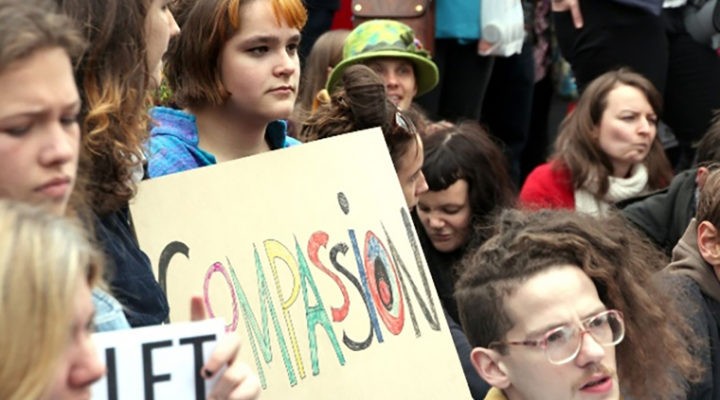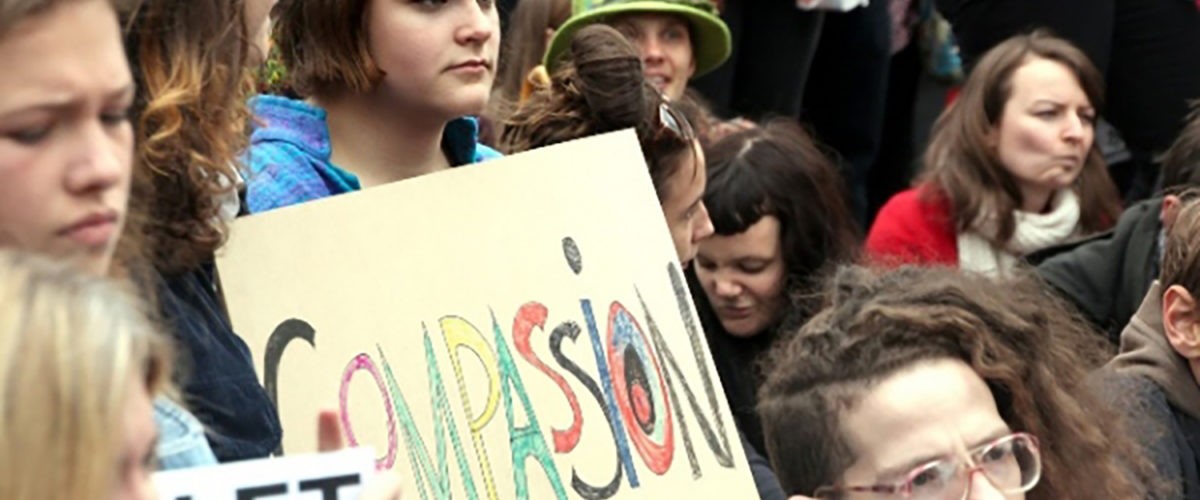Americans supporting the compassionate treatment of refugees are expressing their conviction in a variety of ways and places. It can include fundraising and ministering directly to “the least of these” to sharing their beliefs across social media.
And for churches, clergy and lay Christians it can also mean going directly to the seat of government to ensure political leaders hear what they — and the gospel — have to say on the matter.
An ecumenical group of clergy, inspired by the depiction of the Holy Family as refugees, gathered recently at the Missouri capitol to speak out for Middle Eastern refugees today who are fleeing murderous violence.
“The clergy event was held to change the narrative from fear-based to faith-based,” said Doyle Sager, senior pastor of First Baptist Church of Jefferson City, Mo.

Doyle Sager
Following the terrorist attacks in Paris in November, many U.S. politicians called for blocking Syrian and Iraqi refugees from entering the United States even though the attacks had been mostly committed by French and Belgium citizens. Thirty-one governors announced plans to try to prevent refugee resettlement, but Missouri Governor Jay Nixon was not among them.
When Nixon refused to act against refugees, state lawmakers held a hearing to explore what actions they could take to stop refugees from entering the state. Three days later, clergy sat in the same room in the capitol to offer an alternative perspective.
In addition to Sager, other speakers included a Disciples of Christ minister, a United Methodist pastor, a state Catholic leader, a Quaker leader and a Jewish American who immigrated from France to the U.S. during World War II. Also speaking was Jeanie McGowan, a retired minister who worked at First Baptist Church of Jefferson City and Churchnet.
Like Sager, McGowan emphasized the need to avoid making decisions based on fear. She called the event an “important step in a process to let our legislators know many people of faith believe that our hospitality and welcoming of the stranger is still a biblical mandate that supersedes the fearmongering that is so prevalent today.
“We are no doubt living in a time of fear,” she added. “Sometimes, we allow those fears to erode the basic, decent values that we’ve been taught in our churches, synagogues and mosques — especially those that demand that we extend hospitality to strangers and sojourners.”
McGowan emphasized the teachings of the Bible are clear on the subject of welcoming others.
“Our book of faith, the ‘gold standard’ that we preach from each week, is full of texts that don’t just suggest but command us to welcome the stranger and the alien,” she said. “Jesus modeled the love of ‘other’ and making space for those who are in need, no matter their race or sex or situation — again and again, much to the chagrin of the religious leaders of his day. How can we do less?”
Christian leaders of various denominations and across the country have been outspoken in opposing governmental officials who propose anti-refugee legislation. Sager noted the strong voice on behalf of refugees by leaders of various Baptist groups, including the Cooperative Baptist Fellowship and the Southern Baptist Convention.
“I call upon our elected Missouri leaders to set the tone of visionary moral leadership, not fear-based reaction,” Sager said. “Please do not create for our Missouri citizens the false dichotomy of security versus compassion. They are not opposites, and to imply they are is irresponsible.”
Hoping lawmakers will “make Missouri a place of compassion, a place of fresh opportunity,” Sager noted the Bible “makes at least 60 references to a nation’s duty to care for the stranger, the refugee, the immigrant.”
“How embarrassing if Missouri were to end up on the wrong side of faith, the wrong side of Jesus’ teachings,” he added. Our elected officials talk frequently about being pro-life…. But let’s be consistent. All lives are important to God, and thus, to us. Let’s value all life and make a pro-life difference when we can.”
Sager also connected the issue to the birth of Jesus.
“How embarrassing if Missouri were to end up on the wrong side of the Christmas story,” he said. “Baby Jesus and his earthly parents were refugees, who fled to Egypt to escape a cruel, crazed king. Where would all of us be today if Jesus’ family had been refused entry into a place of safety?”


